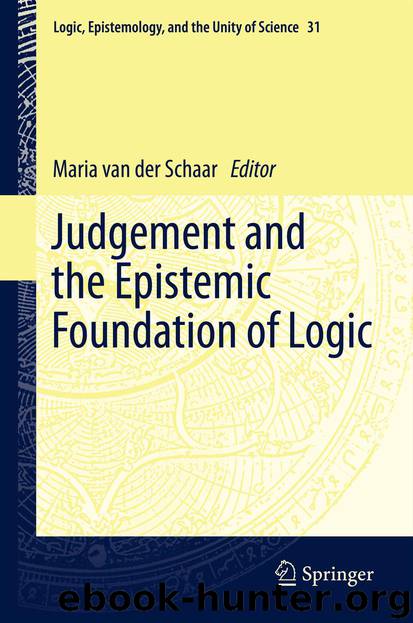Judgement and the Epistemic Foundation of Logic by Maria van der Schaar

Author:Maria van der Schaar
Language: eng
Format: epub
Publisher: Springer Netherlands, Dordrecht
2.As a condition ‘under which alone it is possible to compare what is given so as to form a concept of the understanding of the object’
3.As a condition ‘under which alone some object met with can be subsumed under a given concept of the understanding’
The first class resembles the most natural case given a distinction between (the real use of) the understanding and sensation as the source of concepts. The other two classes stem from the notion of space and time as forms or principles of sensation introduced in the dissertation. As forms or principles, time and space, and therefore sensation, can play a role other than providing the data of the concepts. In the second class, time and/or space as the principles of sensation are means for comparison, although the concepts themselves do not necessarily stem from sensation. In the third class, time and/or space help to correctly identify an object as belonging to the extension of a concept. Here, the principles of sensation take part in the very constitution of the concept.
A prominent example of an axiom in which the first kind of subreption takes place is the axiom ‘whatever is, is somewhere and somewhen’. This axiom, stemming from Crusius, is of a nature almost as general as Kant’s phrases that describe the first class.41 In fact, the axiom is a general description of what according to Kant often occurs in metaphysical discussions. A concrete example mentioned by Kant is that one interprets the presence of God in terms of space.42 In such a case, there are in fact two errors made. First of all, one takes presence as a sensible predicate. The second error, that of subreption, consists in ascribing this predicate to an intellectual concept, namely, that of God. For Kant, the sensible version of the notion of presence is only the condition under which God would be intuited if the first error was not an error.
Kant’s description of the second class of subreption uses the Latin notion of conferri which is translated as ‘to compare’. Concepts result from comparison. In the case of empirical concepts, one compares several objects, subsequently notes shared characteristics, and finally builds a concept from these characteristics. In this manner, what is given is brought together by means of a process of comparison aimed at gathering identical characteristics. The term conferri has exactly this connotation, namely, of bringing things together. This allows one to understand that in the case of pure concepts, the concept of time can play a similar role, for it unites what is given into a concept. This function of time depends on the notion of time as one of the principles or pure forms of sensation, as introduced by Kant in the dissertation. The second class of subreptive axioms is distinguished from the first by the fact that the sensible part is not contained in the predicate itself: [A]lthough it [the concept of time] is not considered to be a characteristic mark of the subject, it nonetheless serves as a means for giving form to the concept of the predicate.
Download
This site does not store any files on its server. We only index and link to content provided by other sites. Please contact the content providers to delete copyright contents if any and email us, we'll remove relevant links or contents immediately.
| Anthropology | Archaeology |
| Philosophy | Politics & Government |
| Social Sciences | Sociology |
| Women's Studies |
The remains of the day by Kazuo Ishiguro(8974)
Tools of Titans by Timothy Ferriss(8365)
Giovanni's Room by James Baldwin(7326)
The Black Swan by Nassim Nicholas Taleb(7106)
Inner Engineering: A Yogi's Guide to Joy by Sadhguru(6785)
The Way of Zen by Alan W. Watts(6600)
Asking the Right Questions: A Guide to Critical Thinking by M. Neil Browne & Stuart M. Keeley(5758)
The Power of Now: A Guide to Spiritual Enlightenment by Eckhart Tolle(5752)
The Six Wives Of Henry VIII (WOMEN IN HISTORY) by Fraser Antonia(5497)
Astrophysics for People in a Hurry by Neil DeGrasse Tyson(5182)
Housekeeping by Marilynne Robinson(4436)
12 Rules for Life by Jordan B. Peterson(4299)
Double Down (Diary of a Wimpy Kid Book 11) by Jeff Kinney(4261)
Ikigai by Héctor García & Francesc Miralles(4246)
The Ethical Slut by Janet W. Hardy(4242)
Skin in the Game by Nassim Nicholas Taleb(4239)
The Art of Happiness by The Dalai Lama(4125)
Skin in the Game: Hidden Asymmetries in Daily Life by Nassim Nicholas Taleb(3989)
Walking by Henry David Thoreau(3953)
